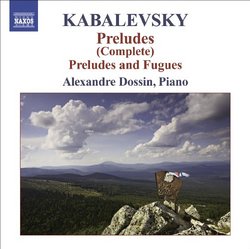Happily, More Kabalevsky from Dossin!
Dace Gisclard | Houston, TX | 07/28/2009
(5 out of 5 stars)
"In a recent rave review of Dossin's Kabalevsky Piano Sonatas (Kabalevsky: Piano Sonatas (Complete)) I expressed the hope that NAXOS would give us another pairing of this composer and pianist. I'm not so vain as to think NAXOS was listening, but I'm delighted to welcome another Kabalevsky/Dossin CD, which brings us most of what's left of Kabalevsky's piano works for adult pianists. (Most of what remains is high-end teaching material.)
Dossin again brings his understanding of this composer's Prokofiev-tinged style to bear, by not playing this music as if it is Prokofiev, realizing there is a strong (and incompletely assimilated) element of traditional Russian romanticism in Kabalevsky's style.
The early (1927) Preludes of Op.5, which I had not previously heard, were a pleasant surprise. Certain passages reminded me of Scriabin, the Debussy Etudes, and even Samuel Barber!
The major item of interest here is the set of 24 Preludes Op.38, each based on a Russian folk tune (No.13 is based on the same tune Stravinsky used in the finale of "The Firebird"). This is a major work in Kabalevsky's canon. Dossin's performances have nothing to fear by comparison with those of Yakov Flier (on an old MK LP) or Konstantin Scherbakov. As in the sonata album, his playing is characterized by clarity without dryness, variety of tone color, scrupulous observation of markings, and imaginative touches of rubato that clarify structure. As for the music, as fond as I am of "The Comedians" and the "Colas Breugnon" overture, I'm beginning to think that Kabalevsky's most substantive works are more often his "private" ones (i.e, piano and chamber music), rather than his "public" ones, such as the piano concertos or the symphonies. The moods of these pieces range from somber or serene, to playful and even comic. There are reminiscences of Shostakovich, Mussorgsky, and Prokofiev. While the piano writing does not offer anything startling new, it is always resourceful and pianistic within the established traditions of the Russian school. The order of keys follows that of Chopin's Op.28 (C major, A minor, G major, etc.). Of course, this order inevitably leads to the last piece being in D minor. Kabalevsky cleverly gets past concluding the set in this dark key by switching to the major mode for an unexpectedly calm ending.
Do not expect Kabalevsky's Preludes and Fugues to be on the same level as those of Shostakovich. These pedagogical pieces have no lofty pretensions. Personally, I liked 1, 2 and 6, but found the others outstayed their welcome beyond the interest of their material. Dossin resists the temptation to run roughshod over these teaching pieces with his virtuoso technique, although No.5 seems a little slow for an "Allegro apassionato". He does not patronize them, or try to wring more depth out of them than they can yield. I doubt the propagandistic "Soviet Realism" titles (i.e., "At the Young Pioneer Summer Camp", "A Feast of Labour") were really in Kabalevsky's mind as he composed, and they don't even appear in the G. Schirmer score I consulted.
Those who enjoyed Dossin's CD of Kabalevsky sonatas should not hesitate--this is a worthy continuation of his series."

